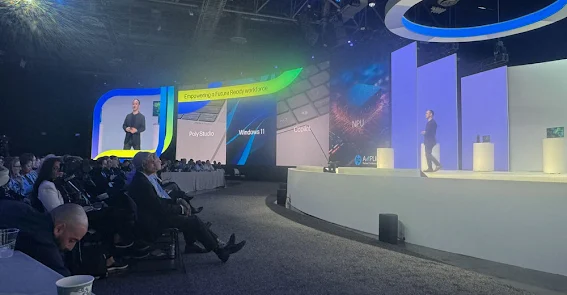HP Amplify 2024: A Tale of Two Days and the Rise of AI PCs
The 2024 HP Amplify Partner Conference in Las
Vegas was a journey of transformation, with the first day leaving many
attendees wanting more and the second day delivering a powerful punch of AI
innovation.
A Lackluster Start
The opening day fell short of expectations.
Keynotes lacked the "wow factor" of groundbreaking announcements, and
while HP reaffirmed its commitment to AI, concrete details were scarce. The
presence of tech giants' CEOs like Intel's Pat Gelsinger and Microsoft's Satya
Nadella added star power, but their discussions on maximizing AI opportunities
remained light on specifics. The urgency for HP's AI pivot was evident, but a
roadmap to achieve it remained elusive.
A Second Act Filled with Excitement
Day two, however, brought a dramatic shift in
momentum. Nvidia CEO Jensen Huang's electrifying interview energized the crowd
with his vision of AI-powered content creation workstations. This set the stage
for HP President of Personal Systems, Alex Cho, to deliver the conference's
defining moment.
Cho's passionate and insightful presentation redefined the AI value proposition for businesses. He unveiled a new generation of AI-powered laptops, desktops, and workstations, heralding a potential
revitalization of the PC market. This "largest-ever portfolio of AI
PCs" boasted the latest processors from AMD, Intel, and Nvidia, designed
to handle demanding generative AI workloads in a hybrid work environment.
Beyond Specs: A Focus on User Experience
Cho's emphasis on use cases, personas, and
experiences was a refreshing departure from the typical tech industry focus on
specs and benchmarks. He recognized that the AI revolution hinges not just on
technology, but on its impact on human potential. He boldly stated that HP aims
to "change the world's fundamental proficiency, productivity, and
creativity" through AI-powered devices.
Product Leadership in AI PCs
Cho highlighted several exciting
developments, including HP's leadership in AI PCs and workstations. He cited a
30% performance and battery life advantage for AMD-based mobile workstations
compared to Intel's offerings. This is significant considering the crucial role
of large language models (LLMs) in generative AI applications, often developed
on desktops.
AI Studio: A Game Changer
The unveiling of HP's Nvidia-powered AI
Studio truly captured the audience's attention. This solution addresses a
critical gap in building generative AI applications by facilitating team
collaboration and rights management. This is essential, as gen AI development
often involves diverse skillsets working in tandem.
With LLMs costing hundreds of millions to
develop, companies are constantly seeking ways to optimize costs. AI Studio
offers a compelling solution, promising faster, less expensive, and more
efficient LLM development.
Standing Out in the Crowd
What sets AI Studio apart?
Prior to HP's announcement, only Nvidia and IBM offered "complete stack" solutions.
However, Nvidia's solution required its own specialized (and expensive)
workstations. The complex security protocols and multi-user collaboration needs
of LLMs make traditional software management inadequate.
While HP readily admits its relative newcomer
status in the AI software space, it has shown flashes of brilliance with its HP
Wolf Security software and popular HP Smart app. The partnership with Nvidia
for AI Studio is a stroke of genius, resulting in a balanced AI collaboration
and management solution. This empowers data engineers to focus on the core AI
project, while streamlining administrative tasks.
Conclusion: HP Amplify 2024 - A Turning Point
The HP Amplify Partner Conference 2024 started slow but ended with a bang. HP's commitment to AI and its leadership in AI PCs are clear takeaways. AI Studio stands as a potential game-changer for cost-effective LLM development.
While questions remain about HP's long-term
software strategy, the company has taken a significant step towards becoming a
major player in the AI revolution.



No comments:
Post a Comment